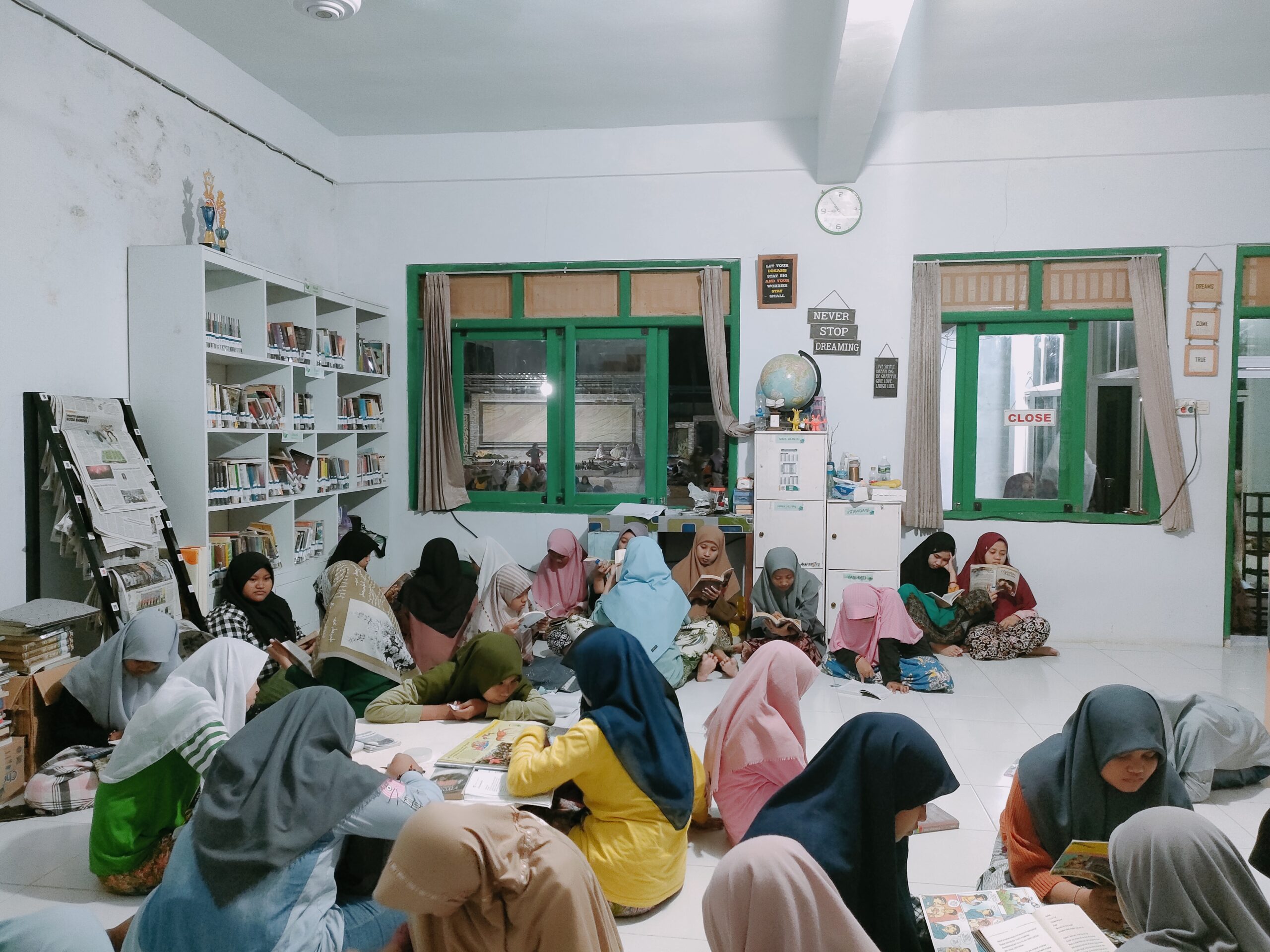The low level of literacy among the Indonesian population is increasingly alarming. It is not only a matter of reluctance to read but also a lack of culture in visiting libraries. Ventensius Gitiyarko addressed this pressing issue in an article published in Kompas on November 20, 2023. Referring to a survey conducted by Kompas Research, which revealed that half of those aware of the existence of local libraries (57.3%) admitted to never visiting, and data from the Ministry of Education and Culture indicating a reading index of 37.32 (2019) on a scale of 1-100, Gitiyarko highlighted the need for efforts to enhance reading interest.
Gitiyarko’s concern likely resonates with those who understand the importance of literacy. The paradox in Indonesian society arises from the fact that, despite being the fifth-largest in gadget ownership, the country has the second-lowest reading interest globally, standing at 0.001% (UNESCO). This discrepancy becomes more significant as literacy media, such as digital books, newspapers, magazines, and even digitized ancient manuscripts, flourish alongside technological advancements.
Library: The Hub of Civilization
The role of libraries in enhancing literacy is crucial, considering that libraries serve as the epicenter of the struggle for literature, knowledge, and civilization. The destruction of manuscripts by the Mongol forces, which reportedly turned the Tigris River black in 1258 AD, marked the beginning of the decline of Baghdad and Islamic civilization, as recorded by Ibn Khaldun in history.
This tragic loss of knowledge serves as a utopia, suggesting that the world should have entered the modern era sooner. Nevertheless, irrespective of this hypothetical scenario, literacy in the world has progressed in tandem with the advancements in communication and information technology.
While Indonesia may still lag behind in literacy compared to other nations, particularly in Europe, the existence of libraries is actively preserved and cultivated within its society. The Government’s Social Inclusion-Based Library Transformation program is a testament to the resounding commitment to this cause.
This program implies that the role and function of libraries go beyond storing and lending books; libraries should also facilitate the community’s development amidst cultural diversity and social changes. They provide opportunities for entrepreneurship, protect and advocate for equality and human rights. All these aspects need to be realized to ensure that libraries remain as the focal point of civilization.
Students and Libraries
Inclusion is an approach aimed at creating an environment open to anyone, regardless of their background, characteristics, physical condition, social status, ethnicity, or cultural differences. This aligns with the vision of the nation’s education pioneer, Ki Hadjar Dewantara, who advocated for inclusive education principles, ensuring that every individual, irrespective of background, social status, or ability, has an equal right to quality education.
As a vital component of the educational environment, the library must bridge the gaps created by limitations. Adequate and equal facilities should be provided for individuals with different interests and backgrounds.
Pesantren being religiously-based educational environments in Indonesia, should also play a crucial role in maximizing the utilization of libraries. As an alumnus of a pesantren, I am concerned about the reading interest of students.
In 2021, during the From Home’s Community Service Program (KKN – Kuliah Kerja Nyata) period due to the pandemic, a friend of mine observed, or rather researched, the reading interest in our boarding school. The results showed that it was still low. Moreover, from personal experience, whenever I visited the school library, I encountered the same students repeatedly, with no noticeable change.
Considering that students are prohibited from using electronic devices, I believed it could increase their interest in books, steering them away from the distractions of gaming or social media. However, the reality is that students’ interest in books remains lackluster and uninspiring. What factors contribute to this? The environment, undoubtedly, takes precedence, followed by other factors such as facilities and supporting activities.
When the surroundings are filled with people reading anytime, anywhere, we gradually develop an interest in opening the pages of a book, eventually growing to appreciate and love it. Research by Fadila Ita Qulloh W has proven this. Fadila revealed that engaging in reading activities or borrowing books can motivate students to read together, eliminating boredom while reading.
In addition to the reading environment, library facilities need to be developed, including a diverse range of book genres catering to the varied interests of students. The acquisition of comprehensive books will help ignite the reading passion among students. For instance, acquiring both old and new books, such as novels, history books, poetry/short story anthologies, magazines, newspapers, etc. For students interested in traditional Islamic texts, the provision of books on jurisprudence, mysticism, interpretation, and even literature in Arabic should be facilitated.
A well-equipped library and a conducive reading environment will ultimately attract students who are not inclined to read books. Some students may have no interest in delving into traditional texts, especially when faced with a poor library. Isn’t it the responsibility of educational institutions as knowledge-seeking platforms?
References:
Farah Arriani, dkk., Panduan Pelaksanaan Pendidikan Inklusif, (Jakarta: Kemendikbudristek, 2022).
Fadila Ita Qulloh W, “Pengembangan Literasi Dalam Peningkatan Minat Baca Santri Pada Perpustakaan Mini Pesantren Pelajar Al-Fath Rejomulyo Kediri,” Jurnal Pengabdian kepada Masyarakat Nusantara (JPkMN) 1(2), Maret 2021.
Woro Titi Haryanti, “Perpustakaan Berbasis Inklusi Sosial,” TALENTA Conference Series: Local Wisdom, Social, and Arts (LWSA). 2(3). 2019.
Ventensius Gitiyarko, Grafikota Perpustakaan Masih Sepi Pengunjung, https://www.kompas.id/baca/metro/2022/08/24/ accessed at November 20, 2023.









